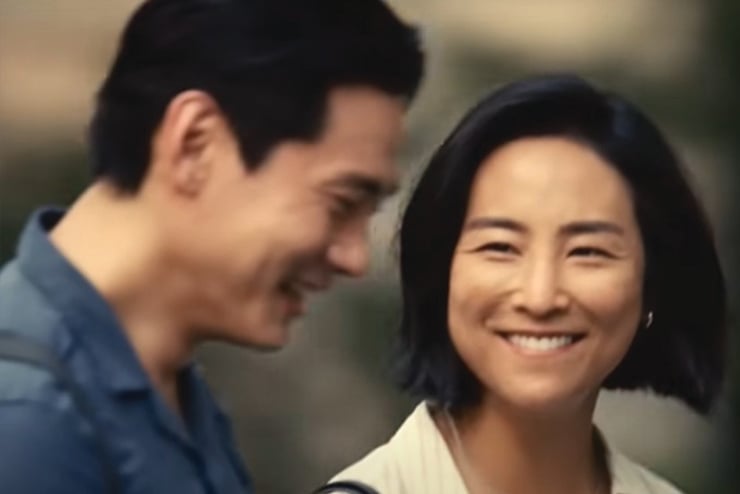Past Lives
Directed and written by Celine Song ◆ Produced by CJ ENM ◆ Distributed by A24
At a time when big-budget blockbusters that say little of anything monopolize American entertainment, it pays to notice some of the smaller, more poignant cinematic fare coming out of Asia, especially South Korea. In Past Lives, a Korean-American drama directed by first-time director, Celine Song, Na Young (Greta Lee) and Hae Sung (Teo Yoo), are two 12-year-old South Koreans drawn to one another. It’s first love, and a sweet date follows, one arranged by Na’s mother and chaperoned by Hae Sung’s mother. We then see the departure of Na’s family as they move to Canada, and this weighs heavily on the hearts of the tweens. The haunting lyrics of the soundtrack cover of Rihanna’s “Stay” fit the unwinding of the film’s plot into an uncertain future.
Once in Canada, Na changes her name to “Nora.” She becomes enamored of literature and eventually becomes a playwright. Later, while in grad school at NYU and in search of a deeper emotional connection, she reunites with Hae Sung—but online, since he’s then in Korea. The couple appears to be rekindling their feelings of love. Then the reality of a long-distance, online relationship sets in, and Nora cuts off communications. Hae Sung is hurt, but like Nora, he eventually finds a new romantic partner. In Nora’s case, she meets her future husband, a white American writer named Arthur, at a posh writer’s retreat in Montauk, New York. While Arthur is sympathetic and loving, he comes off as an interloper in a love story that was already unfolding.
Nora tells Arthur that Koreans believe in in-yun, or fate, but she dismisses the concept as a seduction technique Koreans use while flirting. It’s clear, however, that in-yun is shaping the lives of both Nora and Hae Sung, who finally meet again in person in their mid-30s. Hae Sung tells Nora that in this life she is destined to leave behind their childhood love, but in a past or future life, perhaps they had been or would be able to remain together.
Of course, the answers to these questions were moot by the time they meet again. In this life, Nora leaves Hae Sung, and he’s understandably heartbroken. The audience is left to reflect on a bittersweet connection that was not meant to be and feeling painfully robbed of an ending in which Nora and Hae Sung have their happily ever after. This is why the idea of in-yun seems so unappealing to Western ears. It obviously differs from the more pleasant “multiverse” twist in Gwyneth Paltrow’s late ’90s flick, Sliding Doors.
In that film, Helen, played by Paltrow, lives out two versions of her life with two different romantic partners. The various outcomes are determined on the basis of whether the protagonist makes or misses a train. While Sliding Doors suggests many possible life paths, the one that seems “better” doesn’t always end happily. The multiverse concept also pops up in the latest iteration of the Spiderman saga, Spiderman: Across the Spider-Verse, which had a $120 million opening weekend in June. Its success underscores how deeply drawn viewers are to the idea that within one lifetime one can experience different possible existences. Think about all the narrative possibilities and the multiple endings this cinematic device offers! In Past Lives, we can imagine Nora and Hae Sung together and having babies in Korea. But we can also picture her in another existence living in an East Village walk-up with the timid Arthur and ordering grocery delivery.
In the 2019 Korean drama Parasite, directed by the accomplished Bong Joon Ho, we find parallels with Past Lives. This earlier film also features an ill-fated couple, Ki-woo and Da-hye, but this couple is separated by the social and economic gulf between their parents’ worlds. Parasite also presents star-crossed lovers, but their story is less poignant. As the circumstances are stacked against them from the beginning, the focus is more on the struggle of their families. Romance here takes a backseat to social conflict, and even this strife is handled with appropriate dark humor.
Perhaps that’s what made Past Lives more difficult to watch. The film demands we shed our Western ideas and adopt an Asian mindset about fate. It does not allow us to enjoy happiness as we want or expect it, but instills a fatalism that, at best, offers a future with a few crumbs of joy. Parasite by contrast is unconcerned with illustrating an Asian notion of fate. It dramatizes the trickery and deceptions happening in the here and now, in which a poor Korean family tries to take over the home and social position of the family they work for. Somehow that’s an easier bite to swallow than an ill-fated first love.

Leave a Reply